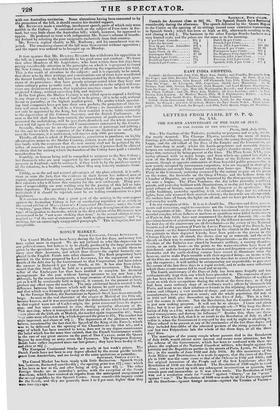It thus appears that Mr. Humus HUGHES has withdrawn his
opposition to the bill, in a manner highly creditable to his good sense and candour. We learn that other Members of the Legislature, who have within these few days been paying considerable attention to the principles on which it is proposed to found the New Colony, have declared in favour of allowing the experiment a fair trial. This is the result of attention to the subject : and it is especially to be noted, that those who by their writings and conversations out of doors have manifested the fiercest hostility to the bill, have been distinguished by their thorough igno- rance of its provisions: they have grossly misrepresented what they have not taken ordinary pains to undo tend. A little attention to the subject will con- vince any disinterested person, that legislative sanction cannot be denied to the projected Colony, without exceeding folly and injustice. In the first place, the Mother Country is not called upon to expend a farthing in any shape or way : not a foot of land is to be given ; all is to be sold, without favour or partiality, at the highest market-price. The profits which speculat lug land companies have put into their own pockets, the projectors of this co- lony will never touch. It will be a Crown Colony ; its immediate rulers will not only be appointed by the King, but their conduct is to be liable constantly to the supervision of the Colonial Secretary and the British Parliament. As soon as the bill shall have been carried; the association of gentlemen who have promoted the undertaking, will be ipso flicto dissolved, and the whole manage- ment will fall upon the Governor and Commissioners nominated by the Crown.
Secondly, there can be no objection on the score of patronage and jobbing ; for the SUM to which the expenses of the Colony are limited is so small, that even the Governor, it is understood, will receive only 800/. per annum.
Thirdly, all that is asked of Parliament is, permission to purchase, on highly advantageous terms to the Mother Country, certain waste and now unproduc- tive lands, with the assurance that the new society shall not be polluted by the influx of convicts, and that no person or association of persons shall be allowed to obtain that fur nothing which the founders of the Colony have paid a valuable consideration for.
Fourthly, no human being will be compelled to emigrate to the Nee. Colony ; but thousands who are now supported by the parish—that is, by the men of property in England—will be conveyed, if they wish it, by the purchase-money of the colonists, to a healthy country, where they may honestly maintaiu them- selves.
Fifthly, as to the soil and natural advantages of the place selected, it is suffi- cient to state the fact, that the evidence in their favour has induced men of capital, agricultural experience, and personal knowledge of the spot, to join the first colonists who will leave this country fur the new settlement. Many per- sons of respectability are now waiting only for the passing of this bill to take their departure. The pecuniary loss alone which would fall upon hundreds of individuals if it should be rejected, must be no trilling consideration to a just Legislature. It is curious to observe, that a great part of the writing in the newspapers against the Australian Colony is but an everlasting repetition of an article in
the second edition of Mace uttaten's Conntercial Dictionary, under the head
Si Sydney," page 1105. We observe also, that a glowing description of the advan- tage; of emigration to Australia, which in the first edition of the Dictionary was pronotomed to be "not more striking than true," in the wend edition is stig- matized ae "of the sort of statements put forth to allure immigrants," and "a striking, but an exceedingly exaggerated paragraph." This is singular, but not inexplicable.




















 Previous page
Previous page